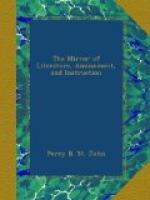Every one will rejoice at the existence of such offices as the Sisters of Charity—benign, nay almost divine; and until this moment, we thought that such had been their real character. Our belief has, however, been somewhat staggered by an article in the last number of the London Review; in which the services of the Sisters are represented in a much less amiable light than we have been accustomed to view them. This notice occurs in a paper on a work by Dr. David Johnston, of Edinburgh, on the Public Charities of France. The Doctor, whose book abounds with evidence of considerable research, thus speaks of the Sisters of Charity:—
“The inmate of an hospital is alone qualified to speak with justice of the blessings which such attendance affords. Possessed of superior education, and from their religious profession placed above many of the worldly considerations which affect nurses in general, the Sisters of Charity act at once as temporal and spiritual comforters, watch over the sick bed, soothe the prisoner in his confinement, and penetrate into the worst abodes of misery, to comfort the distress, and instruct the ignorant.”
Such we also thought had been their portraiture, although we could not so far speak from personal evidence. But the reviewer gainsays all this, and even does more. After drawing a comparison, and not altogether a just one, between the “Sisters of Charity in France,” and ladies of fortune who unostentatiously visit the sick poor in England, he says—
“It is matter of fact, generally observable in the instances of the soeurs de charite, that in the performance of their duties towards the sick, during the first three or four months, they display all that tender solicitude and devotedness, which romance ascribes to them as constant and habitual. After the first feelings have subsided, the soeurs are found to consult, in all their actions, first,




